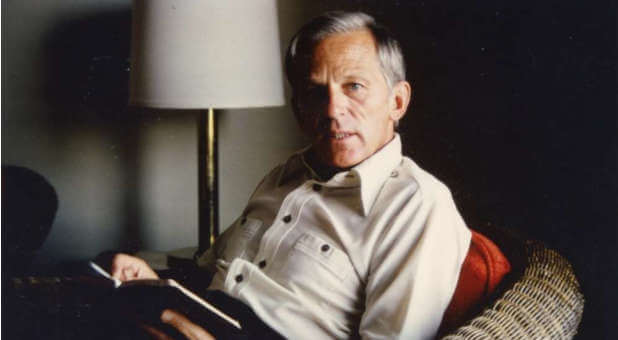When Andrew van der Bijl was a young man, doctors told him he was “too weak to travel” because of his chronic back pain. That advice seems absurd now, when we look back on the life of this legendary evangelist who came to be known as “Brother Andrew.” After he started smuggling Bibles to communist countries in 1955, he went through a dozen passports, visited more than 125 countries and logged more than a million miles—many of them in his famous blue Volkswagen that he called his “miracle car.”
Brother Andrew even survived a plane accident, but he told me the impact of that crash in the early 1970s actually healed his back.
This amazing man served the persecuted church for more than seven decades. When he died last week at age 94, the world lost a hero.
I first learned about Brother Andrew from reading a biography of his life, “God’s Smuggler”—which is at the top of my list of favorite books today. I looked to him as a mentor even though I only knew him from a distance. But in 2004 I had the opportunity to interview him in his home in Harderwijk, Holland. That was when I realized he was my mother’s age.
I was tempted to glamorize Brother Andrew’s daredevil life, as if he were a Christian version of Indiana Jones. But he flatly rejected that comparison. “I am not an evangelical stuntman,” he told me defensively. “I am just an ordinary guy. What I did, anyone can do.”
More than any other leader I’ve known, Brother Andrew modeled Jesus-style humility. But he also displayed amazing courage.
A defining moment for him came in 1957, when he pulled his Volkswagen up to a security checkpoint at the border of Yugoslavia. He had dozens of Bibles hidden in the car, and he had to deliver them to Christians who were starving for God’s Word. Just before the guard began the search, Brother Andrew breathed this prayer:
“Lord, in my luggage I have Scripture that I want to take to Your children across this border. When You were on Earth, You made blind eyes see. Now, I pray, make seeing eyes blind. Do not let the guards see those things You do not want them to see.”
God answered his prayer. The guard didn’t see the Bibles even though they were visible in his suitcase. Andrew drove his car across the border; then he met with small congregations huddled in secret locations. He found them in Budapest, Prague, Cluj and Moscow.
Brother Andrew met his flock in those dimly lit meetings. These were the people he was called to serve. They did not want sermons as much as they wanted companionship. His presence was their reminder that the church in the West had not forgotten them.
Andrew was a heavenly secret agent on a divine mission, and he told me he never once felt fear—not even when he was questioned by snooping border guards, Russian KGB officers and Saudi Arabian police. Despite his daring spirit, he was arrested only a handful of times: In Egypt, Russia and Saudi Arabia.
“I have never really felt danger,” he told me. “The safest place on earth is in the will of God.”
I saw Brother Andrew’s humility when I asked him about how many Bibles he successfully smuggled. The organization he founded, Open Doors, delivered 1 million Bibles to China by way of a huge ship in 1981. But Brother Andrew had disdain for numbers because churches tend to measure success with arithmetic while ignoring what really matters.
“I don’t care about statistics. I place a strong emphasis on people,” he told me. I have made his words a motto in my own life.
What struck me most about Brother Andrew was his love for the Scriptures. I was not surprised to learn that the man who smuggled so many Bibles into unfriendly territory would have more than 1,000 copies of rare Bibles displayed on bookshelves in his private study.
There were French, Polish, English and Chinese Bibles, and dozens of other translations. There were tiny New Testaments and a huge Dutch Bible that predated the King James Version. For Brother Andrew, the Bibles represented the most powerful weapon known to man, and the only hope for a lost world.
He told me before I left his house: “How can people ever love the Savior if they do not have His Word?”
Andrew never seemed intimidated by governments that hated Christianity. Even in the 1960s he knew the Soviet Union would crumble one day. To him, the Soviet regime was a noisy Goliath that would ultimately face a fatal blow.
“Communism was a very stupid philosophy,” he told me. “It is stupid to say there is no God. I saw the emptiness and the hypocrisy of it.”
It was fitting that this humble hero would die just a few days after Queen Elizabeth, and in the same month. Brother Andrew didn’t have as many people at his funeral as the queen did, but in my book he was royalty. And I know a heavenly crown awaits him.
J. Lee Grady was editor of Charisma for 11 years and now serves as contributing editor. He directs the Mordecai Project (themordecaiproject.org), an international ministry that protects women and girls from gender-based violence. His latest book is Set My Heart on Fire (Charisma House).














































